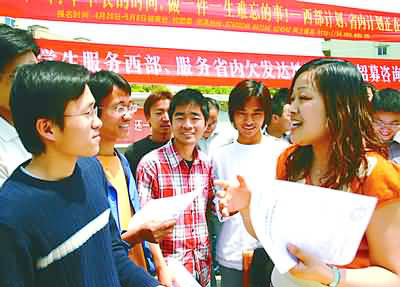|
Many youth leave cities to taste country life
(Reuters)
Updated: 2006-08-22 09:51
Three decades after the Cultural Revolution, tens of thousands of Chinese
students are once again streaming out of cities to the countryside in an
ideological journey to experience rural life.
"I did have a tough time
persuading my parents to let me go, for they suffered at my age in the
countryside," said Zhen Zhu, a student who graduated this summer and will move
to the remote northwestern region of Ningxia in September.

Students from Ningbo University in
Zhejiang Province apply to work in the underdeveloped western
regions. [cnnb.com.cn] |
Zhen is among
about 150,000 university graduates who will leave wealthy eastern cities this
year and head to China's poorer rural regions, including Tibet in the west and
Yunnan in the far south, according to the China Youth Daily.
The number
of young people making the trip to the country is believed to be the highest
since the Cultural Revolution, a turbulent social and political movement which
lasted a decade until 1976.
A few years ago, relatively few students
would have left the comfort and safety of the cities for China's countryside,
which was seen as a dead-end route for their careers and aspirations.
But the journey has once again become popular among some Chinese youth
who see themselves as modern-day pioneers.
The "Serving the West
Project" run by the Chinese Communist Party's Youth League has recruited a total
of 16,000 students for programmes in the countryside since it was set up in
1996. Around 5,000 students have signed up so far this year.
Participants can apply for a monthly subsidy of 300 yuan ($38) -- around
one tenth of the average salary which new university graduates can expect in
China's largest cities.
PRIMITIVE LIVING CONDITIONS
Although the
students will not face the near-famine conditions endured by their predecessors,
living conditions in rural China are generally much more primitive than in
cities.
"Students focusing on money will never choose to go to the west,
as they can make much more in the big cities with their university degrees,"
said Xing Yue, recalling that he went for weeks without showers while teaching
in Ningxia four years ago.
Many of their parents were sent as students
to work in the west as part of the radical "learn from the masses" campaign
during the Cultural Revolution.
The campaign aimed to purify people's
political views by putting them in contact with the peasantry, seen as guardians
of Communist values.
Young people in that campaign endured hunger, harsh
living conditions and backbreaking labour on collective farms and construction
projects. Once in the countryside, they were often barred for years from
returning to the cities. Some had to stay in the country for as long as a
decade.
This time, the students aren't being forced to go. And their
motives are more varied than those of their parents.
Some are looking
for jobs in the small towns of China's hinterland. Despite a booming national
economy, many new graduates are finding it hard to get work in the
ultra-competitive job market of the eastern seaboard.
HIPPIES IN CHINA
An emerging Bohemian strain among China's youth is another reason. For
the first time, tens of thousands of young people have enough money to put off
joining the rat race immediately and to travel in search of fresh experiences.
China's countryside provides an exciting new environment for them,
recalling the road trips made by hippies in the western United States in the
1960s, or hitch-hiking journeys by European students after graduation.
But in a surprising throw-back to the Cultural Revolution, many Chinese
graduates are showing some of the same idealism that initially inspired their
parents several decades ago.
Qian Liqun, a Peking University professor
who spent a decade of his youth in the southwestern province of Guizhou, said
most students going to the countryside "either regard themselves as saviours of
the peasants, or by contrast, see themselves as needing to learn from the
peasants".
Many say they seek to help the undeveloped regions of China,
which have lagged behind the country's economic success.
Many
students believe that working with tough, self-sufficient peasants will help
them learn important values and skills.
"My parents agreed to let me go
because the programme was only for one year, and they knew I would never imitate
them by spending a decade working on a farm for the sake of an ideal. They had
no choice when they were young," Xing said.
"My parents and I aren't
extremists like people were during the Cultural Revolution. But I wanted to have
contact with the soil and to help people," he added.
|
| |
|
| |
|
|
|
| Most Commented/Read Stories in 48 Hours |
|
|
|
|